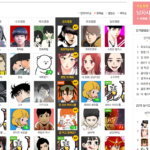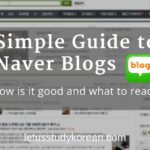
Learning a language is hard, especially when you are doing it by yourself. Today, I want to introduce our readers Hansen, a Korean learner from Indonesia. Just like many Korean learners, Hansen has learned Korean for two years all by himself, and he wants to share his little tips on how to study Korean. If you’re feeling in the dark about how you stay motivated to learn Korean, this short interview will help you set your mind ablaze with advice.
C: Hi Hansen, could you start by telling us a little about yourself?
H: Greetings! My name is Hansen. I love trying new food, working out, and sleeping. I basically repeat those while trying to find a balance.
C: What has allowed you to learn Korean?
H: At first, I was just wondering about how to read those ‘characters’, and I felt Korean was somewhat different from other languages like Japanese and Chinese. Then, as a millennial,
I noticed that many of my friends were watching K-dramas and even learning the language. I was kind of affected by them; had some spare time, so I gave it a go.
C: How do you study Korean?
H: I have two textbooks written by different authors. To challenge myself, I tried to read Hangul without English translation. Also, I tried to learn how grammar works in real life. Having a Korean friend was helpful, because from my experiences, what I learned from the book could be different what a native speaker would say in real life. I’m primarily focusing on learning grammar (80%) and building vocabulary (20%).
C: It’s pretty hard to maintain motivation and consistency when learning a language. What does your personal motivation stem from?
H: I simply like learning Korean and I feel like Korean is relatively easier to learn than other languages. Anyway it’s a bit too far to go back and try a different language, so I just want to continue to learn. There’s nothing to lose…
C: Do you like Korean culture? If so, what do you like most?
H: How they speak differently (as in manners) to elders/friends is kind of unique, and also the dining etiquette.
C: What are your biggest obstacles when it comes to learning Korean?
H: One obstacle is that a word can change its form depending on what sentence structures are followed by. Plus, how it’s written and how it’s pronounced can be different. You know, in English, how you pronounce the word “read” depends on its tense. It took some time for me to get familiar with these grammar rules.
C: How do you practice speaking?
H: Speaking is important, because we need to have a chance to apply what we learned. But then, it’s hard to practice speaking alone. I tried to find a native speaker who could help and correct me.
C: One last thing- for people who have just started with learning Korean and want to improve quickly, what do you recommend?
H: To learn Korean quickly, I think it is important to read your textbook more often. You don’t have to understand the full content when you first read it. What matters is to get yourself familiar with the context. Second, don’t forget building up your vocabulary when learning grammar. Focusing only on grammar without vocabulary is like taking a shower in a 6-star hotel without any soap. When it comes to listening, watching K-dramas could be useful just to check what phrases you can catch and to pick up new phrases. My favorite K-dramas are <닥터 이방인(Doctor Strange), 당신이 잠든 사이에(While You Were Sleeping), W.
Thanks a lot for your time, Hansen. It was a pleasure to meet you.
I hope you found this interview useful. As Hansen mentioned, finding a balance between grammar and vocabulary is important in language learning.




